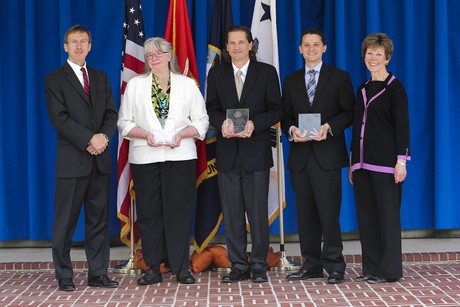Safer batteries made from zinc sponges

Researchers at the US Naval Research Laboratory (NRL) have developed a safer alternative to fire-prone lithium-ion batteries, which were recently banned for some applications on Navy ships and other military platforms. Published in the journal Science, their work is part of an ongoing effort to create water-based zinc batteries.
While suitable for single-use applications, zinc-based batteries are not considered rechargeable in practice due to their tendency to grow conductive whiskers (dendrites) inside the battery, which can grow long enough to cause short circuits. Seeking to solve this issue, Joseph Parker, Jeffrey Long and Debra Rolison demonstrated nickel–zinc (Ni–Zn) batteries in which a three-dimensional Zn ‘sponge’ replaces the powdered zinc anode traditionally used.
“The key to realising rechargeable zinc-based batteries lies in controlling the behaviour of the zinc during cycling,” said Parker, lead author on the paper. “Electric currents are more uniformly distributed within the sponge, making it physically difficult to form dendrites.”
The material was found to extend lifetime in single-use cells; cycle cells more than 100 times at an energy content competitive with lithium-ion batteries; and cycle cells more than 50,000 times in short duty cycles with intermittent power bursts, similar to how batteries are used in some hybrid vehicles. With the benefits of rechargeability while avoiding the safety issues that continue to plague lithium, the sponge is now ready to be deployed within the entire family of Zn-based alkaline batteries across the civilian and military sectors.
“We can now offer an energy-relevant alternative — from drop-in replacements for lithium-ion to new opportunities in portable and wearable power, and manned and unmanned electric vehicles — while reducing safety hazards, easing transportation restrictions and using earth-abundant materials,” said Dr Long.
Hybrid sodium-ion battery can be charged in a few minutes
Researchers have unveiled a hybrid sodium-ion battery that charges in just a few seconds —...
Four-terminal tandem organic solar cell achieves 16.94% PCE
Researchers have fabricated a new four-terminal organic solar cell with a tandem configuration...
Scientists unveil novel material for magnesium batteries
Researchers have developed a cathode material for rechargeable magnesium batteries that could...










